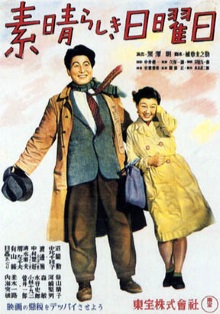
I like to think that we’ve made a decent start at working through Akira Kurosawa’s most famous films but here is something completely different. Though the director is best known for his period samurai films, his filmography is wider than that. This one, made immediately following the end of the Second World War makes for a great example and it reveals a side of the director which isn’t evident in his later epics.
Life is difficult for most ordinary Japanese during the Occupation of the post-war years. The pair of young lovers Yuzo and Masako have jobs but still barely get by and are able to meet each other only once a week on Sunday. On this occasion Yuzo is depressed as he is broke and they find that they only have 35 yen to spend between the two of them. Masako however is determined to make the best of their time together and tries to cheer Yuzo up. Among the things they do include visiting a model of a house that is being sold and visiting a decrepit room available for rent as they dream of being able to finally marry and stay together. Unfortunately it feels as if fate is conspiring against them at almost every turn. When they try to buy cheap tickets to a performance of Schubert’s Unfinished Symphony for example, they find a gang of scalpers buying them up in bulk to resell at a markup. Yuzo gets so upset that he tries to call it a day, declaring that he can see no way out of their dire straits while Masako tries to persuade him how important it is to have a dream of the future.
Shot entirely in black and white, primarily with only the two lead performers and made on a visibly limited budget, this film reminds me strongly of the early Hollywood melodramas such as the ones we’ve seen by Frank Borzage. At the same time, it’s more sophisticated evolution of the style as Kurosawa is able to take his characters through as astonishing range of human emotions. The film is extraordinarily humanistic and intimate, an angle that you wouldn’t have expected to see out of Kurosawa based on his other works. It does at times come close to being hand-wringing misery porn but Kurosawa is masterful enough to inject some measure of joy and most of all hope at the right moments. Like all melodramas, the emotions here aren’t exactly subtle but they are still powerfully affecting and it’s hard to remain impassive as Masako makes a direct plea to the audience towards the end of the film.
I also like that while this is a story of only two people, it manages to include so much detail about life in Tokyo at the time. There’s how the mass produced house they are visiting is considered to be of substandard quality for example, indicating another kind of loss that Japan suffered from the war, or how only those involved in the black market are making any money. Then there’s the long queue of people eager to buy cheap tickets for the orchestral performance, revealing both how starved people are for entertainment and that they consider Western classical music to be suitable and classy diversion. All this and more can be seen in the numerous street scenes as they visit the zoo or rush from one place to another using public transport. It’s extraordinary how informative the film manages to be and how well it captures a sense of what life was like. Rather astonishingly even as it bemoans the tough times, there’s no hint of blaming the Americans for their dire straits.
If further confirmation is needed, the experience of watching this cements the conviction of how Kurosawa truly was a grandmaster of cinema. Its style is dated now as it’s perhaps a little too explicit with its emotions but it remains a fantastic film that is well worth watching today.